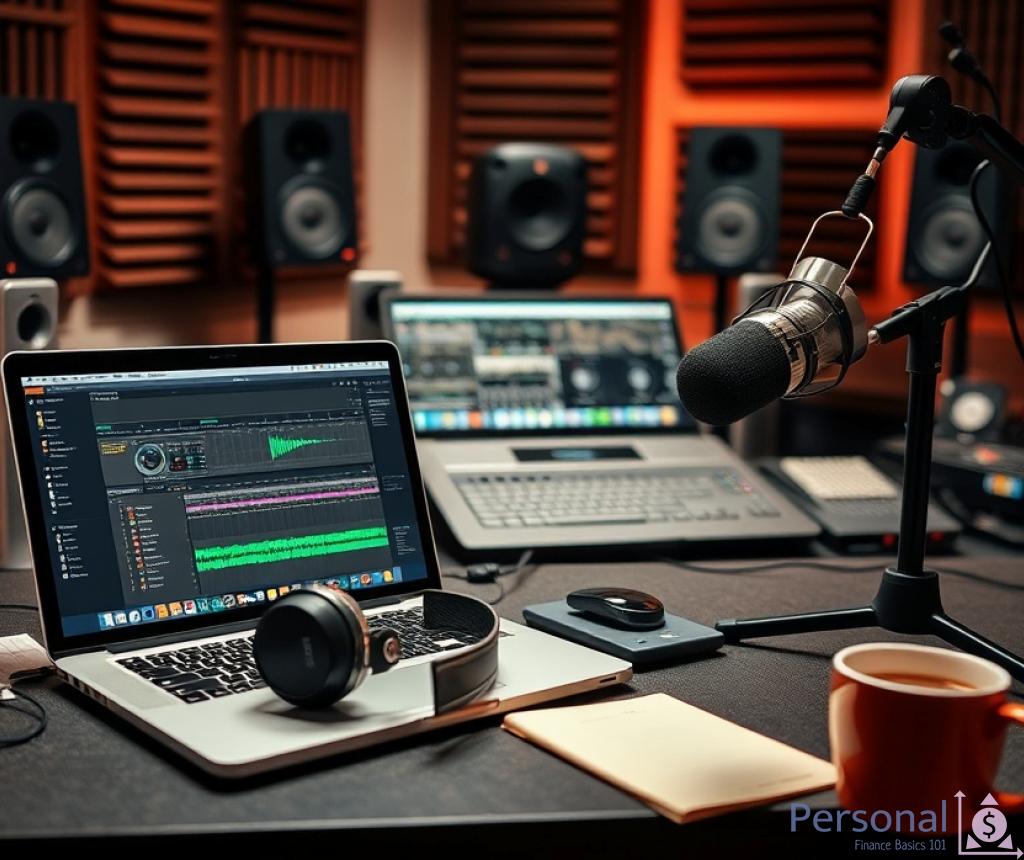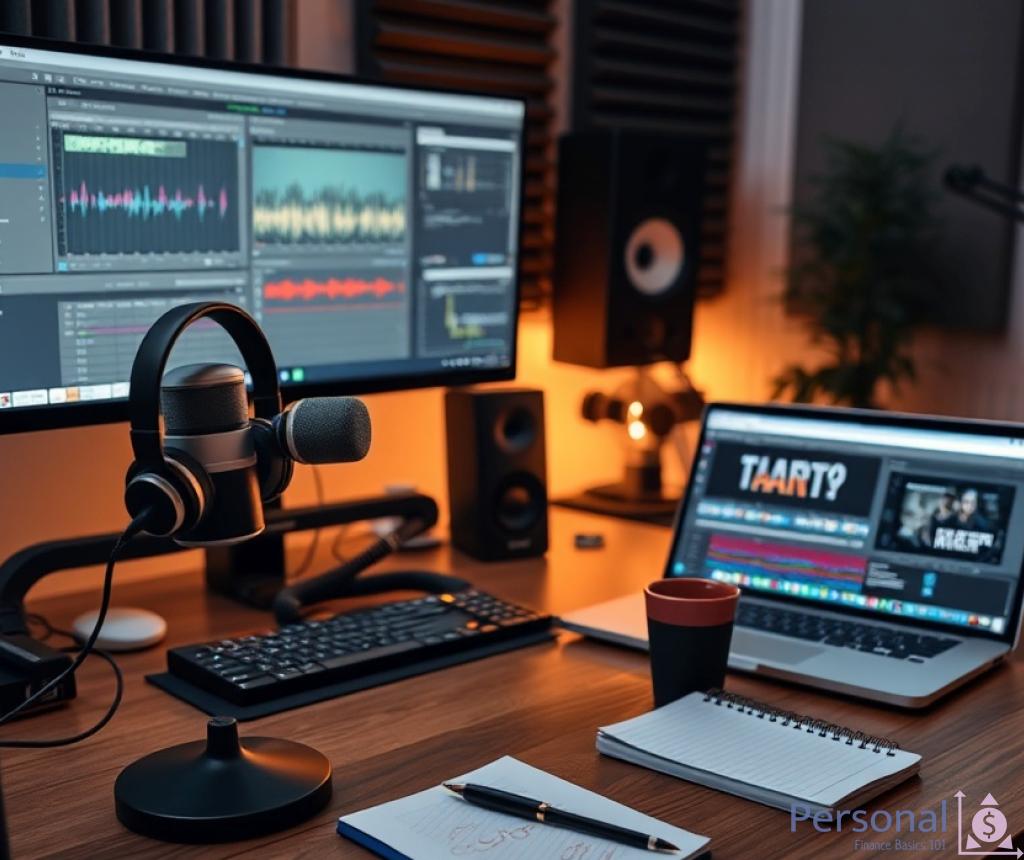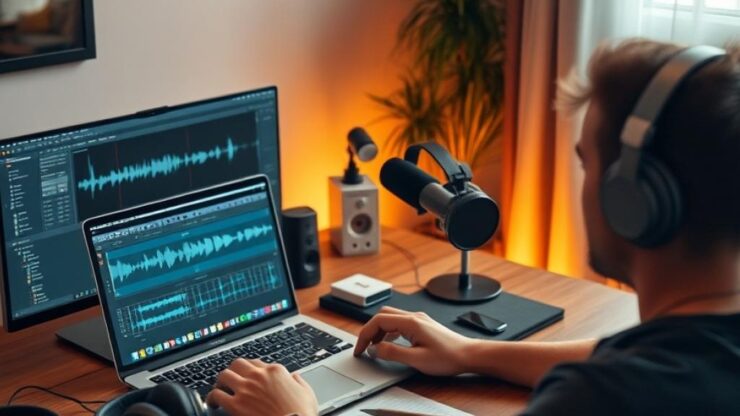Understanding the Basics of Podcast Audio Editing

In the realm of podcasting, audio quality often dictates the success of a show. With an ever-growing audience, listeners have become discerning, expecting clear, professional sound. For aspiring podcasters, understanding the fundamentals of audio editing is crucial. A polished audio product not only enhances the listening experience but also builds credibility and fosters listener loyalty.
When diving into audio editing, several core components must be mastered to ensure the final product resonates well with audiences. Each element plays a vital role in creating an engaging auditory experience.
- Noise Reduction: This involves eliminating unwanted background sounds that can distract from the primary content of the podcast.
- Equalization: Equalizing audio levels helps in balancing frequencies, making voices clearer and more pleasant to listen to.
- Compression: This technique reduces volume discrepancies, ensuring that loud sounds are toned down while quieter sounds are amplified, providing a more uniform listening experience.
- Audio Mixing: Combining different audio tracks seamlessly is essential, especially when incorporating music or sound effects into a podcast.
- Mastering: The final step in audio editing, mastering ensures that the podcast sounds professional and is ready for distribution across various platforms.
Choosing the right tools can make all the difference in podcast audio editing. Various software programs cater to different skill levels and budgets, ranging from free options to professional-grade applications. Here’s a comparison of popular audio editing software:
| Software | Price | Best For |
|---|---|---|
| Audacity | Free | Beginners & Basic Editing |
| Adobe Audition | Subscription | Professional Editing |
| GarageBand | Free (Mac) | Mac Users & Entry-Level Editing |
| Reaper | One-Time Purchase | Customizable Editing |
Understanding these tools and how to utilize them effectively can elevate a podcast from mediocre to exceptional.
Essential Tools and Software for Freelance Editors

Embarking on a freelance podcast editing journey requires not only skill but also the right set of tools to enhance your editing capabilities. With a myriad of options available, selecting the appropriate software can significantly impact your efficiency and the quality of your output. In this section, we will explore the essential tools and software that freelance editors should consider to elevate their podcast projects.
At the core of any podcast editing process lies the software used to manipulate audio tracks. Various software solutions cater to different levels of expertise and specific editing needs, enabling freelancers to choose one that aligns with their workflow and financial considerations. Below is a list of top contenders in the podcast editing software arena:
- Audacity: A free and open-source software, Audacity is a fantastic choice for beginners. It provides essential editing features and supports multiple audio formats, making it easy for novice editors to start their podcasting journey.
- Adobe Audition: Recognized for its robust capabilities, Adobe Audition is a professional-grade software that offers extensive audio editing tools. While it operates on a subscription basis, its advanced features justify the investment for serious freelancers.
- GarageBand: This Apple-exclusive software is perfect for entry-level editors. Its user-friendly interface allows users to create podcasts with ease, integrating music and sound effects smoothly.
- Reaper: Known for its flexibility and customization options, Reaper is a one-time purchase software that appeals to both amateurs and seasoned editors. Its powerful features make it ideal for those looking to advance their editing skills.
In addition to editing software, other tools can significantly improve the editing process and the final audio quality. These tools are designed to streamline workflows and provide essential functionalities that contribute to a polished podcast.
- Microphone and Audio Interface: Investing in a quality microphone and audio interface is crucial for capturing high-quality sound. This equipment ensures that the audio recorded is clear and professional from the start, reducing the amount of editing required later.
- Headphones: A reliable pair of closed-back headphones is essential for accurate audio monitoring. They help editors hear subtle nuances in the audio, making it easier to detect issues that need correction.
- Sound Libraries: Access to sound effects and royalty-free music can enhance a podcast’s production value. Libraries like Epidemic Sound or AudioJungle provide a wide range of options for creative enhancement.
By leveraging these essential tools, freelance podcast editors can not only improve their editing efficiency but also produce high-quality podcasts that resonate with audiences. Mastering the art of audio polishing while utilizing the right software and tools will pave the way for a successful side hustle in the ever-evolving podcasting landscape.
Marketing Your Podcast Editing Services Effectively
In the competitive landscape of podcasting, effectively marketing your podcast editing services can significantly influence your success as a freelancer. Understanding your target audience and crafting a compelling narrative around your skills is essential. Your ability to convey the value you bring to podcasters will not only attract clients but also establish your reputation in this niche market.
Utilizing Social Media Platforms to showcase your editing abilities can yield impressive results. Platforms like Instagram, Twitter, and LinkedIn provide a stage to share snippets of your work, testimonials from satisfied clients, and behind-the-scenes content that demystifies the editing process. By engaging with podcast communities and utilizing relevant hashtags, you can create a network of potential clients while positioning yourself as an authority in audio editing.
Furthermore, creating a professional website serves as a central hub for your services. Here, you can detail your editing process, provide examples of your previous work, and list the packages you offer. Including a blog section where you share tips on podcast audio quality or common editing mistakes can also attract organic traffic to your site. This not only showcases your expertise but also builds trust with potential clients who may be seeking a reliable editor.
The foundation of a thriving freelance podcast editing business is often built on a strong network. Actively participating in podcasting forums, attending industry events, and connecting with fellow podcasters can open doors to valuable opportunities. Engaging with your peers not only enhances your visibility but also fosters relationships that can lead to referrals.
Moreover, consider offering free trials or discounted services to new clients. This strategy allows potential clients to experience the quality of your work without a significant financial commitment. If they are satisfied with the result, they are more likely to return for future projects and recommend your services to others. Building a portfolio of satisfied clients is crucial for establishing credibility, and word-of-mouth referrals can drastically increase your client base.
In addition, maintaining communication with past clients through newsletters or personalized follow-ups can keep your services top of mind. By consistently providing value, whether through updates on industry trends or editing tips, you can foster loyalty and encourage repeat business.
Building Client Relationships in the Podcasting Community
Establishing strong client relationships is paramount in any freelance endeavor, particularly within the vibrant community of podcasting. As a freelance podcast editor, your ability to connect and communicate effectively with clients can set you apart from the competition. The podcasting landscape thrives on collaboration and mutual support, making it essential to build and nurture relationships that can lead to fruitful partnerships and referrals.
One of the foundational elements of building lasting client relationships is the practice of active listening. Engaging with your clients requires you to not only hear their requests but also to understand their unique vision and needs. This involves asking insightful questions, providing feedback, and offering solutions that align with their goals. By demonstrating that you value their input and are committed to their success, you create a strong rapport that fosters trust.
In any freelance business, communication is key. Maintaining open lines of communication with your clients throughout the editing process helps to establish expectations and reduce misunderstandings. Providing regular updates on project progress, discussing potential challenges, and sharing insights can enhance the client experience. Transparency regarding your processes and timelines also helps in building credibility, allowing clients to feel secure in their choice to work with you.
Clients appreciate a personalized touch that speaks to their individual needs. Tailoring your services based on their specific requirements not only showcases your expertise but also reinforces the idea that you are invested in their project. Following up after completing a project can also leave a lasting impression. A simple thank-you message, along with an invitation for feedback, can pave the way for future collaborations.
By integrating these strategies into your freelance podcast editing practice, you can cultivate meaningful relationships that not only enhance your reputation but also contribute to your long-term success in this niche market.
Enhancing Your Skills: Continuous Learning in Audio Editing
In the fast-evolving world of podcasting, remaining ahead of the curve requires a commitment to continuous learning. As a freelance podcast editor, honing your skills will not only enhance the quality of your work but also expand your opportunities in this competitive market. This journey involves exploring new techniques, understanding emerging technologies, and adapting to industry trends. Here’s how you can invest in your growth as an audio editor.
Mastering audio editing goes beyond basic functionalities; it requires a deep dive into advanced techniques that can set your work apart. By familiarizing yourself with complex methods, you can elevate the auditory experience of your podcasts. Here are some advanced editing techniques to consider:
- Multitrack Editing: This technique allows for the manipulation of various audio tracks simultaneously, enabling a richer, layered sound.
- Audio Restoration: Learning how to remove clicks, pops, and other anomalies can greatly improve the overall quality of audio recordings.
- Sound Design: Incorporating creative sound effects and ambient sounds can enhance storytelling in podcasts.
- Spatial Audio Techniques: Understanding how to create a three-dimensional sound experience can captivate listeners more effectively.
The digital age provides a wealth of resources for aspiring audio editors. From online courses to forums, these platforms can facilitate your learning journey. Here’s a list of valuable online resources:
| Resource Type | Platform | Description |
|---|---|---|
| Online Courses | Udemy / Coursera | Structured courses covering audio editing fundamentals and advanced techniques. |
| Forums | Reddit / Gearslutz | Communities for sharing tips, troubleshooting, and networking with other editors. |
| Webinars | Sound on Sound | Live sessions featuring expert discussions on audio editing trends and techniques. |
Engaging with fellow podcasters and editors can lead to invaluable learning experiences. Building a network within the podcasting community not only fosters collaboration but also opens up mentorship opportunities. Attend industry conferences, participate in local meetups, and join online groups to connect with like-minded professionals. Sharing knowledge and experiences can spark new ideas and refine your editing techniques, ultimately resulting in a more polished final product.
Disclaimer
This article has been created or edited with the support of artificial intelligence and is for informational purposes only. The information provided should not be considered investment advice. Please seek the support of a professional advisor before making any investment decisions.






